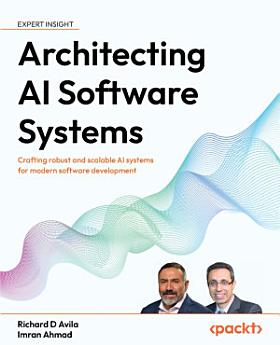Architecting AI Software Systems: Crafting robust and scalable AI systems for modern software development
About this ebook
- Learn to integrate AI with traditional software architectures, enabling architects to design scalable, high-performance systems
- Explore key tools and processes to mitigate risks in AI-driven system development, ensuring timely project delivery and budget control
- Gain hands-on experience through case studies and exercises, applying architectural concepts to real-world AI systems
- Understand the challenges of building AI-enabled systems and managing risks like underperformance and cost overruns
- Learn architectural tools to design and integrate AI into traditional systems
- Master AI/ML concepts like inference and decision-making and their impact on architecture
- Use architectural models to ensure system cohesion and functionality
- Simulate and optimize AI performance through prototyping and iteration
- Design scalable AI systems using patterns and heuristics
- Integrate AI into large systems with a focus on user experience and performance
This book is designed mainly for software and systems architects responsible for designing and integrating AI capabilities into existing and new systems. It also serves as a valuable resource for CTOs, VPs of Engineering, and aspiring architects seeking a comprehensive understanding of the holistic approach to AI system development. Additionally, AI/ML engineers and software developers will benefit from gaining deeper insights into the architectural principles that underpin AI systems, enabling them to align their work with broader architectural goals
About the author
Mr. Avila is a software and systems architect with over two decades of industry experience building complex software systems. He has architected and held leadership roles for building a wide array of software systems from complex simulations, autonomy and data analytic systems. He is also a principal investigator for AI topics. He has published in referred journals and industry publications on command-and-control theory, assurance architectures, multi-agent modeling, and machine learning. He was the first expert instructor on data analytics at University of Maryland Baltimore County – Training Centers. Before working as a software and systems architect, he served in the US Navy as a submarine officer. He resides in Annapolis, Maryland USA.
Imran Ahmad is the author of the “50 Algorithms every programmer should know”. He has been a part of cutting-edge research about algorithms and machine learning for many years. He completed his PhD in 2010, in which he proposed a new linear programming-based algorithm that can be used to optimally assign resources in a large-scale cloud computing environment. In 2017, Imran developed a real-time analytics framework named StreamSensing. He has since authored multiple research papers that use StreamSensing to process multimedia data for various machine learning algorithms. Imran is currently working at Advanced Analytics Solution Center (A2SC) at the Canadian Federal Government as a data scientist. He is using machine learning algorithms for critical use cases. Imran is a visiting professor at Carleton University, Ottawa. He has also been teaching for Google and Learning Tree for the last few years.






